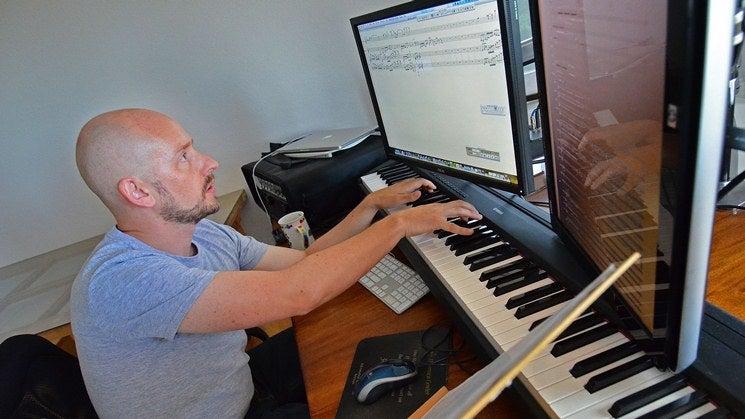Colorado's infamous history coming to stage
Alferd Packer’s story will soon be portrayed musically in a chamber opera

The rich history of the ordeal and resulting trial, societal reactions, and the mystery surrounding it have inspired numerous books and creative presentations. In recent years, CU-Boulder students voted to name the UMC cafeteria the Alferd Packer Restaurant & Grill with its slogan, “Have a Friend for Lunch.”
Packer’s story will soon be portrayed musically in a chamber opera being composed by Associate Professor Daniel Kellogg. When Kellogg works on the Packer composition in his home music studio, he can see Longs Peak looming in the distance, serving as a visual reminder of Packer’s mountain misadventure.
“This story has great ingredients for musical expression,” said Kellogg, who teaches composition courses to undergraduate and graduate students at the CU-Boulder College of Music. He has served on the faculty since 2005.
Working on one of his own compositions or a commissioned piece of music, Kellogg begins by noodling around on the piano searching for the notes that will express an abstract idea and how he wants listeners to connect with the piece, either viscerally or intellectually.
With his favorite mechanical pencil in hand, Kellogg sketches the musical notes on paper. As ideas solidify into workable musical phrases, he then moves between piano and computer, refining, polishing, perfecting. Compositions can take anywhere from a few weeks to several months to complete.
He often draws inspiration from sacred themes and nature and is moved to express the deep desire humans have to understand their place in the world.
“When I feel like I’ve perfectly realized what I want the piece to say, that’s when I know I’ve done my best,” he said. “Most of the time the creative process is a struggle and it ought to be, because if it’s not, then you’re probably not offering your best work.”
Kellogg shares an office on campus with his wife, Hsing-ay Hsu, a concert pianist and the artistic director for the Pendulum New Music Series at the College of Music. At their home, Hsu has her own music studio. She serves as a sounding board for Kellogg’s work.
“She has an amazing musical mind and gives remarkable insights,” he said. “We’re creative partners on a lot of projects and I really enjoy that.”
When he was a sophomore in high school, Kellogg decided to devote his life to expressing his creativity. He liked photography and built a darkroom in his parents’ basement. The local newspaper paid him $15 a shot for black and white photos of school events. But it was music that strongly called to him.
He wrote his first original composition for a high school class project. During his freshman year in college, Kellogg began exploring the expressive range of possibilities of composing music.
“I love the process and challenge of creating something,” he said. “Whether it’s photography or music or even cooking, there’s a great challenge and excitement in the process. There’s also agony and torture, and finally a profound and lasting joy in the process of creating.”
A graduate of the Curtis Institute of Music, Kellogg earned a master’s of music and a doctorate of musical arts from the Yale School of Music. His musical compositions have been performed at Carnegie Hall, Lincoln Center, the Kennedy Center and broadcast on NPR to much acclaim. The Washington Post counted his CD Beginnings among the top five classical discs of 2004.
Among his many composition honors, Kellogg has received two Charles Ives Awards from the American Academy of Arts and Letters and six ASCAP Morton Gould Young Composer Awards.
One of the benefits of teaching at CU-Boulder for Kellogg is being part of a dynamic musical environment fueled by his interactions with talented students. In his class called Tragedy and Inspiration, students are exposed to a variety of music in which aspects of their own life stories resonate with the body of work.
“As a composer, I’m experiencing life through my unique lens,” said Kellogg. “Creating something good takes work and that work is more than just putting in hours at the piano writing music,” he said. “It’s living a life that breathes creativity.”




